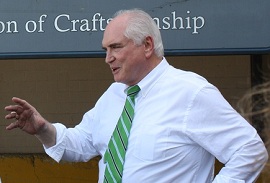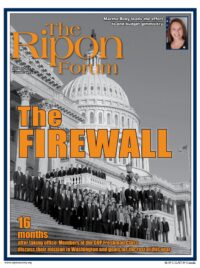
In the spring of 2009, I was sitting at my desk in my Chevy/Cadillac dealership in Butler, PA, when I received a call from a representative of the new, government-run General Motors. I was told that, despite the fact that Kelly Automotive had met every established metric of success, exceeding customer service industry standards and meeting GM’s own sales projections for our dealership, we had to shut down our Cadillac franchise under the company’s recent restructuring.
Although I successfully fought GM’s efforts to destroy a part of my family business that we spent decades building, hundreds of privately owned dealerships across the country weren’t as fortunate.
One of the problems with the government takeover of GM was that every dealer’s fate rested in the hands of an unelected board of directors, who, with their limited understanding of and experience in the industry, played the game of picking winners and losers, something the federal government has been doing with alarming frequency.
I decided to run for Congress, in part, because of the fact that in the span of a five minute phone call, the federal government attempted to upend my father’s legacy and the legacy I planned to leave my children. It was a rude awakening and a clarion call to action, not only in defense of my family and business, but in defense of the limited government and free market principles on which our great nation was founded.
I decided to run for Congress, in part, because of the fact that in the span of a five minute phone call, the federal government attempted to upend my father’s legacy and the legacy I planned to leave my children.
Since I’ve been in Congress, my eyes have been further opened to the ever-expanding role of government in our private lives and the devastating effect it will have on our economy, individual liberties, and quality of life.
One of the biggest culprits of big government is the Patient Protection and Affordable Care Act. This mammoth piece of legislation involves the takeover of one-sixth of the U.S. economy, representing one of the largest expansions of government in modern history.
The health care law will cost nearly $2 trillion in the first 10 years, almost double what the president told the American people it would cost. It will also force millions of Americans to lose their current insurance, despite the president’s repeated assurances that under his plan people could keep their current health care if they liked it.
Furthermore, the Affordable Care Act raids Medicare of $500 billion, weakening a treasured social safety net that is teetering on the brink of bankruptcy, and will implement a rationing panel of yet another group of unelected officials who will make decisions that will affect access to health care for millions of senior citizens.
In addition to the health care law, there’s the Dodd-Frank Act, which will affect every sector of the financial services industry by adding roughly 400 new federal rules at an implementation cost of $2.9 billion over the next five years. So far, 185 rules have been written. Compliance with these rules is expected to cost the private sector more than 24 million hours each year. As for the yet-to-be written rules, their unknown implications only create further uncertainty at a time when America’s job creators can least afford it.
And while the president’s efforts to push through cap and trade legislation failed, the EPA under his administration has managed to introduce devastating new regulations that have decreased the domestic production of energy and threaten the future of the coal industry, which is an abundant and affordable source of energy, responsible for producing nearly 50 percent of America’s electricity.
If we are going to grow our economy, we need to shrink our government, repealing the overreaching and industry-threatening regulations that are building barriers to our economic recovery while burying us further into debt. To this end, I will continue to work with my colleagues in the House to pass legislation that will remove the red tape, restore fiscal discipline, and reclaim the American dream that so many before us fought to achieve and which we are responsible to defend.
Mike Kelly, the owner of an automobile dealership which employs more than 100 people, represents the 3rd District of Pennsylvania in the U.S. House of Representatives.




